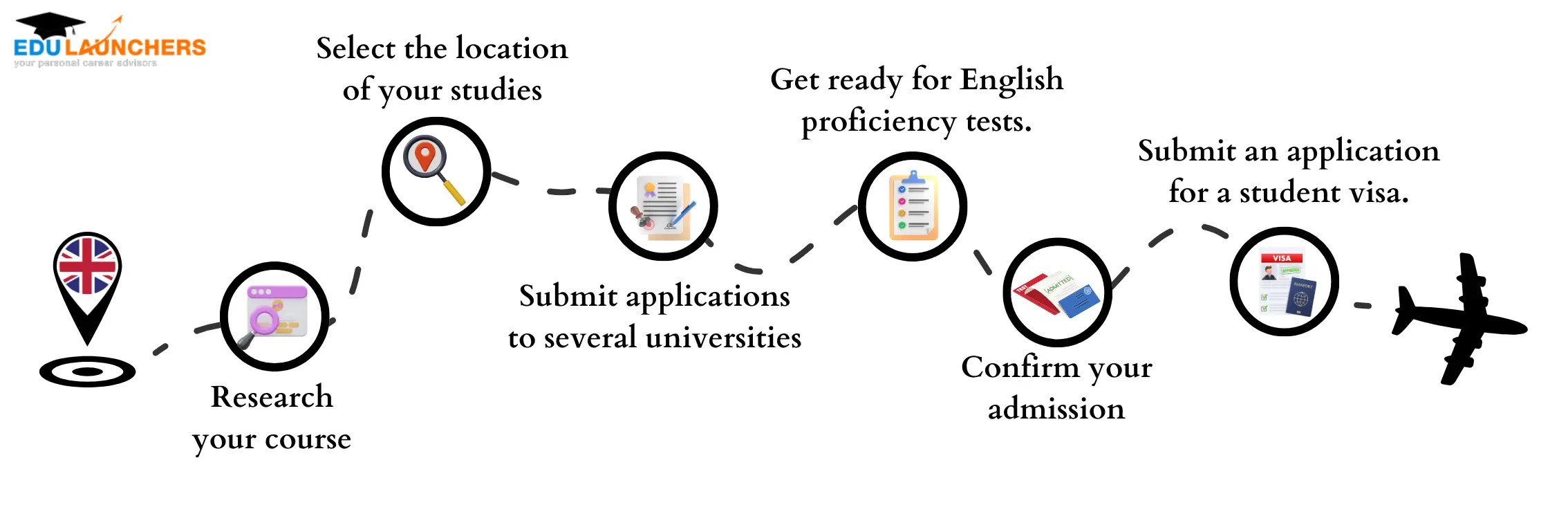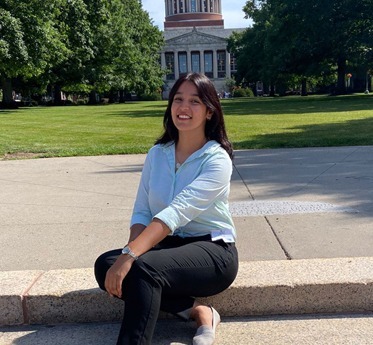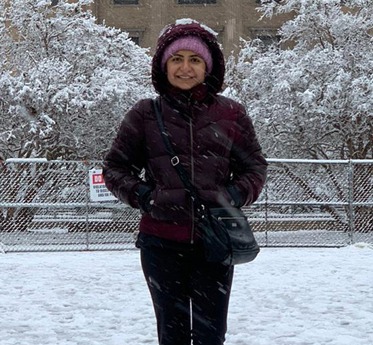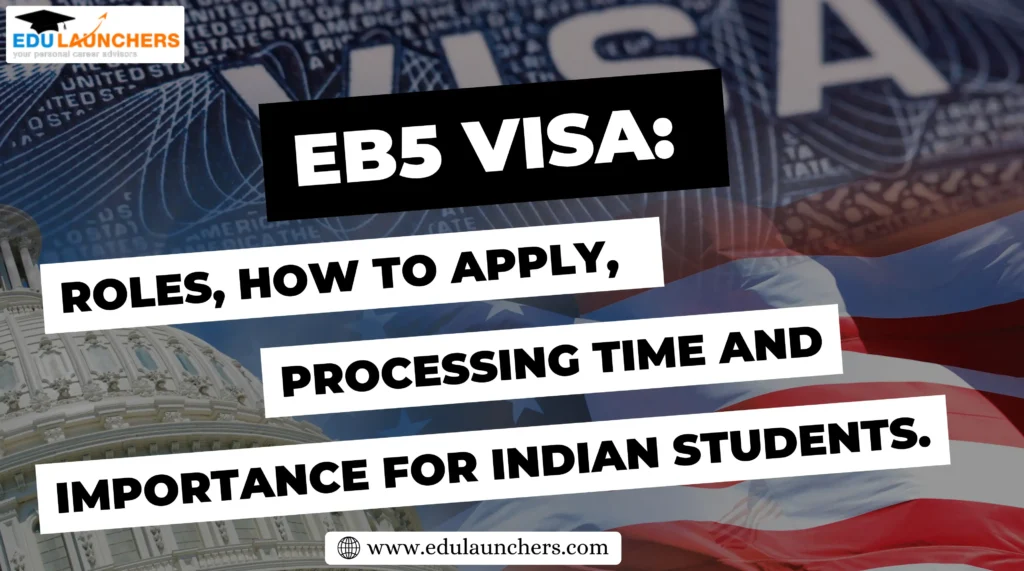Study in UK
The United Kingdom (UK) is a well-liked study destination for international students, especially Indian students, due to its great universities, rich cultural legacy, and varied academic options. This thorough guide will go over all the many aspects of studying in the UK, such as universities, courses, fees, need for a visa, and more.
Why Study in the UK?
The UK permits international students to work while studying and the degree provided by the universities will hold a global recognition for all the courses. With providing an affordable cost of study and scholarships in the country there are a lot of chances for innovative research opportunities. A blend of all the cultures and various courses to choose from UK allows students to enhance their skills and grow. The UK is one of the safest options of places to live freely and study what you like.
- Scholarships are provided for financial help globally.
- Global recognition for the courses and qualifications.
- Affordable cost of study.
- Innovative career opportunities.
- A vibe with a blend of global cultures.
- One of the safest places to live and study.
- The UK permits international students to work while studying.
Quick Facts About UK
- UK is the top choice for students seeking to study abroad.
- Universities in the UK offer a variety of unique and unusual degree programs.
- Degrees offered by UK universities are highly recognized worldwide
- UK is a center for academic excellence.
- UK offers outstanding academic support and facilities to students.
Steps to Start Studying in the UK

Eligibility to Study in UK
Higher Study Options | Minimum Educational Requirement | Minimum Required Percentage | IELTS/ TOEFL Score | Backlogs Information | Other Standardized Tests |
Bachelors | 12 Years of Education (10+2) | 60% | Overall, 6 with 5.5 in each band | Up to 10 backlogs | NA |
Masters | 3-4 Years of Graduate Degree | 60% | Overall, 6.5 with no band less than 6 | Few universities require a GMAT score in addition to a 2-year full-time work experience. |
Benefits of Studying in UK
- The UK permits international students to work while studying and the degree provided by the universities will hold global recognition for all the courses.
- With providing an affordable cost of study and scholarships in the country there are a lot of chances for innovative research opportunities.
- A blend of all the cultures and various courses to choose from UK allows students to enhance their skills and grow.
- The UK is one of the safest options of places to live freely and study what you like.
Higher Study Options
| Part-time work duration allowed | Post-study work permit | Can departments work full-time? |
Bachelors | 20 Hours per week | 2 Years | Yes |
Masters | 20 Hours per week | 2 Years | Yes |
Requirements for Students Applying to UK
To be eligible to study in the UK, you must meet the following criteria:
12th grader: Candidate must have a score close to 80% or more to apply for any high-ranked university in the UK, for any mediocre university the individual should have a score of 70% to 80% and some local universities of the UK may accept any score around 55% to 70%.
Bachelor’s degree: the candidate must have a minimum of 60% or above score in their previous educational reports. This is required to pursue any bachelor’s degree in the United Kingdom.
IELTS/TOEFL Requirements: Overall, 6 with 5.5 in each band. TOEFL is an English language proficiency exam produced by US services which stands for Test of English as a Foreign Language.
IELTS is an International English Language Testing System. Both these test scores are converted into Bands depending upon the efficiency of the results with 1 being the least and 9 being the highest.
Educational Requirements to Study in UK
Career Options | Educational Requirement | Minimum Required Percentage | IELTS/TOEFL Score |
Bachelors | Completed 12 Years of Education (10+2) | 60% | Overall, 6.5 with 5.5 in each band |
Masters | 4-year graduate degree. Very few universities will accept a 3-year bachelor’s degree | 65% | Overall, 6.5 with no band less than 6 |
Study in the UK for Indian Students
Indian students are drawn to the UK for higher education for various compelling reasons:
Rich Educational Legacy: The UK has a time-honored tradition of delivering top-notch education, attracting students from every corner of the globe.
Cultural Affinity: The vibrant Indian community in the UK creates a sense of belonging for Indian students, fostering a supportive environment and a feeling of familiarity.
Financial Assistance Opportunities: Many universities in the UK extend a helping hand to international students, including those from India, by offering scholarships, grants, and bursaries. This assistance significantly eases the burden of tuition fees and living expenses.
Employment Prospects: The chance to work part-time during term and full-time during breaks is a game-changer for Indian students. It’s not just about managing living costs; it’s an invaluable opportunity to gain hands-on work experience, enriching their skill set.
Post-Graduation Work Avenues: Upon completing their studies, eligible students can leverage the Graduate Route. This opens up the possibility of working in the UK for up to two years (or three years for those with a Ph.D.), paving the way for exciting career prospects.

Cost of Studying in the UK for International Students
University Fees depend upon the study program you choose. The table below gives information about the course and average tuition fees.
Study Program | Average Tuition Fee in GBP (£) |
Undergraduate Bachelor Degree | 6,000 -25,000 |
Postgraduate master’s degree | 10,000-30,000 |
Doctoral Degree | 13,000-40,000 |
Higher Study Options
| Average Tuition Fee per Year | Visa Fee | Living Expenses for 1 Year/Proof of funds for 1 year |
Bachelors | 11,000 Above | 490 GBP | 9,000 – 12,000 GBP |
Masters (MS/MBA) | 15,000 GBP & Above |
UK students must pay a fee of £9,250 per year to study at prestigious English universities. You must pay anywhere between £10,000 to £38,000 for other degrees.
| S.No | University | Average Tuition fees (GBP) |
| 1. | University of Bolton | 11,250/year |
| 2. | Leeds Beckett University | 14,000/year |
| 3. | University of Greenwich | 15,100/year |
| 4. | University of Stirling | 16,775/year |
| 5. | University of Chester | 12,950/year |
| 6. | Teesside University | 13,000/year |
| 7. | University of West London | 13,250/year |
Upcoming intakes in UK
UK universities and colleges offer 2 intakes. We recommend applying well in advance, as admissions and scholarships become more competitive as the deadline approaches. It is advisable to submit your application 4 to 6 months before the commencement of the academic session for better chances of selection.
Intake 1 | Intake 2 |
September | January |
Study Options | Duration | Intake Months | Deadline to Apply |
Bachelors | 4 Years | Sep (Major), Jan (Minor) | 6 months before the intake month |
Masters | 1-2 Years | Sep (Major), Jan (Minor) | 4-6 months before the intake month |
Popular Universities in the UK

University of Birmingham

Queen Mary University of London

The University of Manchester

King’s College London

University of Warwick

University College London

University of Edinburgh

University of Oxford

University of Cambridge
University of Nottingham, Nottingham, England
Top 5 Universities in UK 2024
Global rank | Universities |
2 | University of Cambridge |
3 | University of Oxford |
6 | Imperial College London |
9 | UCL |
22 | The University of Edinburgh |
Courses to Study in the UK

- MBBS
- Business Administration
- Computer Science & IT
- Engineering
- Hospitality Management
Types of UK Student Visa
There are three main types of UK student visas:
Student Route Visa:
This visa is issued to those who are applying to study in and college or university for more than 6 months or those who have chosen an English language course for more than 11 months.
Child Student Visa
This visa is for those who are under the age criteria of 18 years or less.
Short-Term Study Visa
This visa is for those who are there in the country to study English courses with a length shorter than 12 months.

UK Student Visa Requirements
- Detailed report cards of your educational qualifications (high school, graduation, post-graduation), with a score above 55% to 90% in your academic sessions before applying to the UK is necessary. The academic reports can be easily collected from the educational institutes that the applicant was studying in.
- CAS (Confirmation of Acceptance for Studies), is a letter that is documented by the UK universities to those who have been accepted by the universities. This document is necessary as it shows the details of the individual describing the study department and study durations in which the applicant has been selected.
- Acceptance letter from the university you’re applying to for further studies. An acceptance letter will be issued by the institute in which the applicant is been selected.
- IELTS with 5.5 bands or above or any other language proficiency proof (depending on the university) is necessary, with band 1 being the least and band 9 being the top level of excellence one has in the English language.
How to Apply for a UK Student Visa
Step 1: Check if you qualify for a UK visa.
Step 2: Prepare by gathering all necessary paperwork.
Step 3: Apply for a UK visa Online.
Step 4: Await the status of the approval.
Step 5: Go for education in the UK.
Visa Processing Time
Processing Time for the UK is usually 1 month. However, all the categories (student, child student and short-term student) for the study visa have about 3 weeks of processing time. Processing time starts when you submit all the required documents and identity verifications to the applicator. Processing time ends when you get an e-mail to let you know that a decision has been made on your request. The current processing time is around 3 weeks but if you have discrepancies related to your application you will be notified with an e-mail.
Scholarships Provided to Students
Scholarship name | Amount per year |
The Commonwealth Scholarships for PhD and Master’s | Up to 12,000 GBP |
The Chevening Scholarships for Master’s | Up to 18,000 GBP |
BrokerFish International student scholarship | Up to 822 GBP |
Gates Cambridge Scholarships for International Students | Up to 45,000 GBP |
UWE Chancellor’s Scholarships for International Students | Up to 15,750 GBP |
Reach Oxford Scholarships for Developing Country Students | Up to 19,000 GBP |
The UK Universities/Colleges scholarship amounts and programs are subject to change, so it’s important to check the individual websites for the most recent details. Indian students should also confirm the requirements for eligibility and the application process.
Work Authorization for Students
International students can work up to 20 hours as part-time during their semesters and up to 40 hours during the holiday session. Student should complete the criteria of being 18 and above and they will not require any permit for working if they are still studying for full time. During the university breaks or holidays students are allowed to work part time or full time as per there requirements.
Why Choose EduLaunchers for Studying in UK?
We at EduLaunchers are committed to making the process of pursuing higher education overseas as easy and stress-free as we can. Being a member of the Edulaunchers family, we take pride in being a one-stop shop that can meet the needs of every student. Our team of professionals will assist in finding the ideal study abroad program for a student based on their academic background, interests, financial situation, and career goals. Additionally, we offer totally free immigration counseling and advice. We are dedicated to make the process as simple and effortless as we can since we are passionate about assisting students in realizing their aspirations. Allow us to assist you in realizing your aspirations!
Recently Graduated Students



Our Latest Blog
Recently Asked Question
To study in the UK from India, you must research universities and programmes, check their admission requirements, apply for a student visa, and arrange funding. You can also take help from education consultants or agencies.
The cost of studying in the UK has risen over the years. Indian, EU and UK students who want to be admitted to prestigious English universities must pay a minimum of £9,250 (~INR 918316.19/-) per year.
Many UK universities will typically accept international students with a two-year study gap. However, you can apply to some universities if your study gap is over two years. If you have a three-year gap in your studies, you can apply for an undergraduate degree at some UK universities.
Yes, your spouse can work full-time in the UK. There are no restrictions on the type of work they can do except – No work as a doctor or dentist in training.
Yes. It is possible to get PR in UK after studying. After the PSW visa expires, people expecting to stay in the UK longer must apply for a skilled work visa, a normal work visa (Tier 2 visa), or any other relevant visa. To obtain a Tier 2 visa, the General Work Visa, a candidate must earn a minimum of £25,600 per annum or £10.10 per hour (whichever is higher).
Students on full-time degree-level courses holding a student visa can work in the UK. The requirements and rules are as follows: Up to 20 hours per week during the university term. The UKVI defines a “week” as “seven days beginning on a Monday and ending on a Sunday”.
Yes, IELTS is generally required to study in the UK as it is one of the most accepted English language proficiency tests by UK universities. However, some universities may accept other tests, such as the TOEFL or the Cambridge English test.
You must provide a Statement of Purpose (SOP) and Letter of Recommendation (LoR) [optional for undergraduate courses] along with language proficiency scores of IELTS,
TOEFL, PTE, etc.
Most international students require a student visa to study in the UK. It’s easy to find out whether you need a study visa or not; just check the UK Government website.
To apply for higher studies in the UK:
- Choose the course and university first, then check the admission requirements and application deadline.
- Prepare all required documents, such as transcripts, English language test scores and personal statements.
- Apply online through the University website or UCAS.
However, if you are under 16, you will need written consent from a parent or legal guardian (or one of the parents if they are solely responsible). Note that UK study visa requirements also vary with age. Also, there is no upper age limit for student visas in UK.





